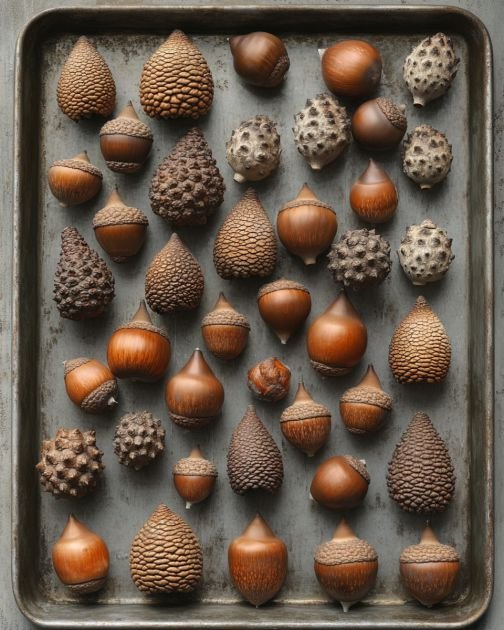As the leaves begin to fall and the air turns crisp, gardeners everywhere are preparing their plots for the winter months. While many focus on raking leaves and trimming back perennials, there’s another autumnal task that can greatly benefit your garden: collecting acorns. These small, often overlooked nuts are more than just a sign of the changing seasons; they are a treasure trove of benefits for the avid gardener.
Acorns, the seeds of oak trees, are abundant in many regions during the fall. While they may seem like a nuisance when they clutter your lawn or garden paths, these little nuts can be put to good use in a variety of ways. From enriching your soil to providing a habitat for wildlife, acorns are a versatile and sustainable resource that can enhance your gardening efforts.
1. Acorns as a Natural Fertilizer
Acorns are rich in nutrients that can be beneficial to your garden soil. They contain essential minerals such as phosphorus and potassium, which are vital for plant growth. By grinding acorns into a fine powder, you can create a natural fertilizer that can be sprinkled over your garden beds. This acorn meal can be mixed into the top few inches of soil, providing a slow-release source of nutrients that will feed your plants over time.
To make acorn fertilizer, start by collecting a large batch of acorns and removing their caps. Dry the acorns thoroughly, then use a grinder or food processor to pulverize them into a powder. Apply approximately 1 cup of acorn meal per 10 square feet of garden space, and gently work it into the soil. This natural amendment can help improve soil fertility and promote healthy plant growth.
2. Creating a DIY Acorn Mulch
Mulching is an essential practice for conserving moisture, suppressing weeds, and regulating soil temperature in your garden. Acorns can be used to create an effective and attractive mulch that serves all these purposes. By crushing acorns into smaller pieces, you can make a mulch that not only looks appealing but also gradually breaks down to enrich the soil.
To create acorn mulch, collect and wash your acorns to remove any dirt or debris. Use a hammer or mallet to crack them into smaller pieces, aiming for a size similar to wood chips. Spread a 2-3 inch layer of acorn mulch around your plants, being careful not to pile it against the stems. This mulch will help retain soil moisture and reduce the need for frequent watering.
3. Attracting Wildlife to Your Garden
Acorns are a natural food source for a variety of wildlife, including squirrels, deer, and birds. By incorporating acorns into your garden, you can attract these creatures, adding life and movement to your outdoor space. This can be particularly beneficial if you’re interested in creating a wildlife-friendly garden.
To attract wildlife, consider setting up a designated area where you scatter acorns. This could be a corner of your garden or a specific feeding station. Not only will this provide food for animals, but it will also encourage biodiversity, which can help with pest control and pollination.
4. Acorns as a Pest Deterrent
While acorns attract certain wildlife, they can also act as a deterrent for some garden pests. The tannins in acorns are natural compounds that can repel insects and other unwanted visitors. By strategically placing acorns around your garden, you can create a barrier that helps protect your plants.
To use acorns as a pest deterrent, scatter whole or crushed acorns around the perimeter of your garden beds. The bitter taste and smell of the tannins can discourage pests such as slugs and snails from crossing the barrier. This natural method can reduce the need for chemical pesticides, making your garden more eco-friendly.
5. Crafting with Acorns: A Creative Outlet
Beyond their practical uses in the garden, acorns offer a wonderful opportunity for creativity. They can be used in a variety of crafts, from simple decorations to intricate art projects. This can be a fun and rewarding way to engage with nature and express your artistic side.
Consider using acorns to create seasonal wreaths, garlands, or table centerpieces. You can paint them, glue them together, or combine them with other natural materials like pinecones and leaves. Crafting with acorns is not only a great way to decorate your home and garden but also a perfect activity to enjoy with family and friends.
6. Acorns for Soil Improvement
In addition to their use as a fertilizer, acorns can improve soil structure and health. When acorns decompose, they add organic matter to the soil, enhancing its ability to retain moisture and nutrients. This can be particularly beneficial in sandy or poor-quality soils.
To use acorns for soil improvement, simply bury them in your garden beds or compost pile. As they break down, they will contribute to the organic content of the soil, improving its texture and fertility. This process can take several months, so it’s best to start in the fall and allow the acorns to decompose over the winter.
7. Using Acorns to Grow Oak Trees
For those interested in long-term gardening projects, acorns offer the potential to grow your own oak trees. This can be a rewarding endeavor that contributes to reforestation efforts and provides shade and habitat for wildlife.
To grow an oak tree from an acorn, start by selecting healthy, mature acorns. Soak them in water for 24 hours, discarding any that float. Plant the viable acorns in pots filled with a mix of soil and compost, about 1 inch deep. Keep the soil moist and place the pots in a sunny location. Once the seedlings have grown strong enough, they can be transplanted to a permanent location in your garden.
8. Acorns as a Sustainable Resource
Acorns are a renewable and sustainable resource that can be harvested year after year. By utilizing acorns in your garden, you are making use of a natural product that requires no additional inputs or energy to produce. This aligns with sustainable gardening practices and reduces your reliance on synthetic fertilizers and pesticides.
Collecting and using acorns also supports local ecosystems by maintaining the natural cycle of growth and decay. By incorporating acorns into your gardening routine, you are contributing to a more sustainable and environmentally friendly approach to gardening.
9. Acorns in Composting: Boosting Nutrient Levels
Acorns can be a valuable addition to your compost pile, providing a rich source of carbon and nutrients. When added to compost, acorns break down and contribute to the overall nutrient content of the finished product, making it more beneficial for your garden.
To compost acorns, crush them into smaller pieces to speed up the decomposition process. Mix them with other compost materials, such as kitchen scraps and yard waste, ensuring a balance of green and brown materials. Over time, the acorns will decompose, adding valuable nutrients to your compost and ultimately enriching your garden soil.
10. Acorns for Decorative Garden Features
Acorns can be used to create unique and natural decorative features in your garden. Their distinctive shape and texture make them ideal for a variety of garden art projects, from simple accents to elaborate installations.
Consider using acorns to create garden mosaics, pathways, or borders. You can also incorporate them into planters or garden sculptures. By using acorns as decorative elements, you can add a touch of natural beauty to your garden while also making use of a readily available resource.
11. The Environmental Benefits of Collecting Acorns
Collecting acorns can have positive environmental impacts beyond your own garden. By gathering acorns, you are helping to manage the natural seed dispersal process, which can prevent overpopulation of oak trees in certain areas. This can help maintain a balanced ecosystem and reduce competition for resources among plants.
Additionally, by using acorns in your garden, you are reducing waste and making use of a natural resource that might otherwise go unused. This contributes to a more sustainable and environmentally conscious approach to gardening, benefiting both your local environment and the planet as a whole.



